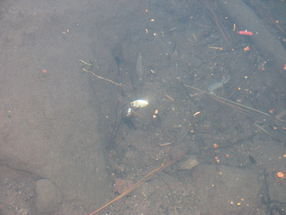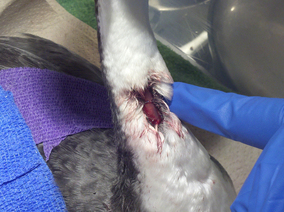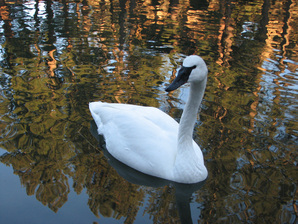 Hard to believe, but this is a treble hook fishing lure - right where Grace has been feeding. Unbelievable. It must have washed up in the last day as I scour the bottom of the river when I drop her food. Luckily I found it before she did. Found out that it is legal for fisher folks to be able to any kind of lure in the downtown river section. Which means anyone who wades or swims into the river or feeds on the bottom of the river is at risk for getting these stuck in them. The one that got Grace was much larger than this one, but still a lure like this is going to get eaten by some bird eventually. When swallowed, fishing lines and lures are death sentences for birds. 22% of brown pelicans taken in by the International Bird Rescue have line or lure injuries. Lures can be swallowed whole by larger birds like herons, egrets, or other fish eaters. They get impaled into webbed feet, stuck into necks and wings, and impaled into tongues.  Western grebe with lure gash, she or he likely ripped the lure out, leaving this wound. You can see the line mark where it was wrapped around its throat. Without putting a bird like this into water and floating it, rehabbers cannot know the extent of their injuries. Once floated, this one wound up having another gash and line injury further down its neck that we missed on intake. Western grebe with lure gash, she or he likely ripped the lure out, leaving this wound. You can see the line mark where it was wrapped around its throat. Without putting a bird like this into water and floating it, rehabbers cannot know the extent of their injuries. Once floated, this one wound up having another gash and line injury further down its neck that we missed on intake. Grace was a lucky bird - many people saw her and called a variety of folks. I cringe to think of the likely thousands who perish under the water, wound up in line, and drowning without anyone ever knowing or seeing them. This is a real risk for the fish eaters or swim through the water like bullets - your mergansers, grebes (horned, eared, pied-billed, westerns, clarks), fresh water cormorants, and loons. Conscientious fisher folks use barbless hooks, hooks that biodegrade, and do all they can not to cut their lines. No lure biodegrades fast, but eventually they will rust out. The one I found was very rusty, but still have sharp points, enough to hook a bird. So the bird would have had a rusty lure stuck in its tongue. I used to fish...as a longtime Alaskan it is kinda in our blood to eat fish. But I don't now. Trout have extraordinarily sensitive mouths, way more sensitive than humans. They live through their mouths - feeling their food and picking out what they want. So imagine the pain - yes fish have pain studies show - of getting a lure hooked into your lips and then because you have a bony structure and the hook cannot just pull out, you are forced to fight for your life, getting pulled all over the place by hook in the most sensitive part of your body. Projecting? You bet. Fish have feelings. So do birds. The antiquated and unsophisticated philosophy of Descarte and Bacon which founded our ridiculous notions that animals could not feel is as old, as it is...well old. Anyway, back to Grace. Here are some current shots of her....showing off her impressive beauty, and that of the Deschutes River. Enjoy Comments are closed.
|
AboutNative Bird Care's is celebrating its 10th anniversary! Our main focus is song, shore, and waterbirds. We offer specialized care and facilities for these extraordinary birds.. Archives
July 2024
Categories
|


 RSS Feed
RSS Feed